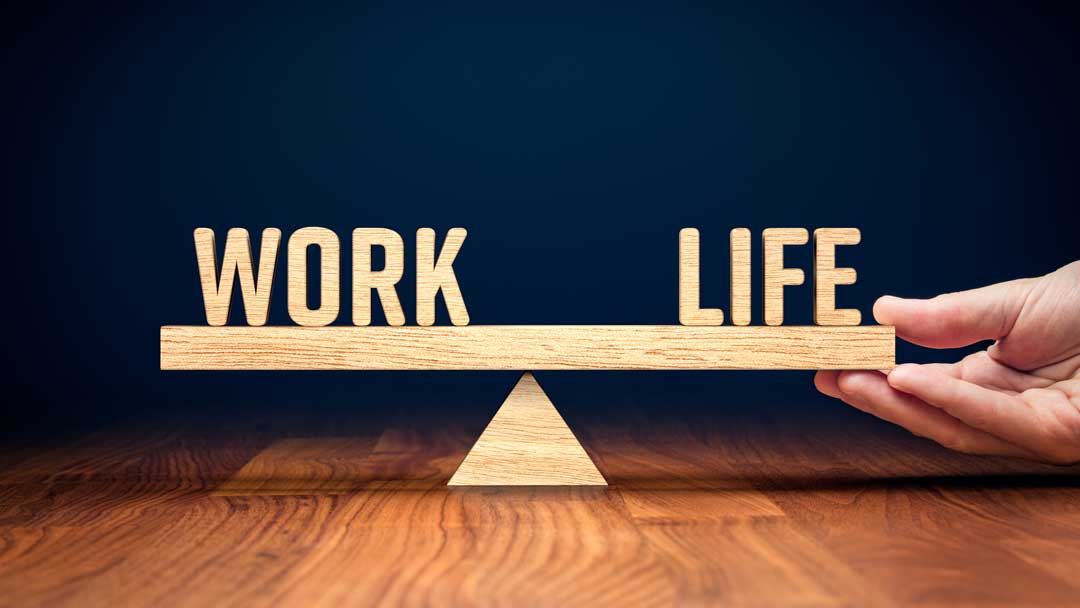If you ever wonder if you might be working too much, ask yourself the following: Do you feel like you’re running on empty every day? Can you recall the last time you had a decent night’s sleep? Is it difficult to separate work and home life?
If you answered yes to any of the above, you’re not alone. The good news is there are ways to improve work-life balance.
As one of the registered counsellors providing private video appointments at TELUS Health MyCare™, I have seen a growing number of men who are dealing with unhealthy levels of stress.
A big part of stress and anxiety is feeling like you’re not fully in control of your life anymore. You’re running from task to task at work, or from chore to chore at home, or from task to chore to some other responsibility, without having the time to really appreciate or enjoy any of it. As soon as one challenge ends, it seems like another begins, making you feel like you’re caught in an endless “what’s next?” loop.
The first step begins with understanding what work-life balance means and how it relates to you.
What is work-life balance?

Work-life balance is about setting boundaries that make time for emotional, mental and social satisfaction at work and at home. These boundaries can include things like not taking work home, not checking work email on weekends, and leaving work on time each day, even if you’re in the middle of something. (Unless you’re a heart surgeon, in which case you should probably finish up). While work emergencies may cause these boundaries to vanish from time to time, do your best to stick to them.
The “life” half of this balancing act is about spending your time meaningfully outside of work. Whether playing with your dog or your kids at the park, hiking in the woods, or honing your bowling technique, try to banish those “what’s next?” thoughts and live in the here and now.
It’s important to note that work-life balance looks different to different people. A shift worker, for instance, is going to balance the two sides differently than someone who works nine to five. A parent with teenagers or toddlers is going to balance them differently than someone approaching retirement. To achieve work-life balance, in any circumstance, men must find ways to make time for meaningful, rewarding or enjoyable things.
Before we explore how to do that, let’s see how YOUR work-life balance is doing.
Signs you’re struggling with work-life balance

Work-life imbalance is usually caused by the unreasonable expectations we place on ourselves or that are placed on us by others. Another common cause of an imbalance is an inability to say no. It’s sometimes hard to know what’s essential and what’s not. Either way, these expectations keep us stuck in a cycle of putting more and more (and more) on our plates.
What happens when your plate gets piled too high? How do you know when you have an imbalance?
Burnout
If simple tasks seem overwhelming, you could be experiencing burnout. You might feel like you don’t have time to practice healthy habits, yet spend your time unproductively (like checking your phone an unhealthy amount of times).
Anxiety and depression
Constantly feeling that you’re not doing enough or that you’re not good enough can cause anxiety. Depression can make you feel like nothing is fulfilling in your life.
Relationship problems
This might feel like you never have enough space and time to connect emotionally with your loved ones. This disconnect can cause those relationships to break down, and you might notice that you’re arguing or feeling annoyed more often than usual.
Exhaustion
Feeling like you are always tired. The constant desire to feel rested yet not feeling rested even when you get the proper amount of sleep. This can contribute to chronic feelings of stress because you can’t ever get the restful relief you need.
Poor sleep
If you go to bed with a racing mind, it’s hard to get the sleep you need. You will know you didn’t get enough restorative sleep when you don’t feel refuelled in the morning, even if you did manage to catch a few zzz’s.
Lack of patience
When you feel like nothing provides relief from all of the above, your patience often wears thin. If you have kids at home, you might find yourself yelling at them more than usual. Or avoiding interactions, like playing and reading to them before bed, that are actually some of the gifts of having children.
Self-neglect
As much as you might like wearing pyjamas all day on the weekends, failing to get dressed, take a shower, or groom yourself as you normally would all week long, may be signs of work-life imbalance. You might also feel unmotivated to do things you normally enjoy, like reading or taking your dog for a walk.
Tips for better work-life balance
When you feel like something is missing in your life, it’s human nature to make big changes. Exercise like an Olympian every day! Kale for breakfast, lunch and dinner! The trouble is, this can actually make the situation worse because you’ll feel defeated. This happens when you set standards too high, and you can’t achieve your goals or sustain them for the long run. That’s why I encourage guys to THINK SMALL and sustainable.
Here are some simple ways you improve your work-life balance:
Create a disengagement ritual
If you work in an office, strengthen the boundaries between work and home by creating a little ritual at the end of the work day. Turn on an email notification saying you’re not going to respond until the next day, turn off your computer, and turn off your phone. Another great way to celebrate the end of your work day is to take a 20-minute stroll to help shift your mindset from work mode to relax mode.
Switch to a paper calendar
Having a month-by-month paper calendar on the wall of your workplace can help you set priorities and know when to say “no” to tasks that could end up piling your plate too high. Keeping a calendar on your phone, while convenient, isn’t great for getting a big-picture look at your schedule and prior commitments.
Take time to remember what matters
What matters the most to you? This might seem like a simple question, but it’s easy to forget when you’re feeling burnt out. This is something we rarely do, yet when we identify what matters, it helps us know where to set our boundaries and where to focus our energy.
Ask for help
Too often, people who care about us want to be helpful, but they don’t know how or where to help. Asking friends and family for help, or drawing on the local community for support, is not a sign of weakness. Having the courage to ask, and working to make life better for yourself and those around you, is a sign of strength!
Set a consistent sleep schedule
To get a solid night’s sleep—7 to 9 hours is the sweet spot—block all the light sources from your bedroom and cover the LED lights on your electronics. Our brains are programmed to wake when it’s light and sleep when it’s dark.
Make time for fun
Plan a night out with friends a couple of times a month. Go to a movie, the pub, a walk, bowling, anything where you can hang out and have fun. If you can’t plan a night out with the guys, then go solo and find an event or join a special interest club—anything that gets you out and around other people is good for the “life” side of work-life balance.
Just say no
Most of us grow up feeling that “no” is a bad word. But it’s actually a way of showing respect for others by being clear about what we can do and what others expect of us. Instead of thinking of “no” as a rejection, try seeing it more as an opportunity for problem solving.
What are some of your favourite ways to shut your brain off from work at the end of a long day? Share in the comments below.

Men’s Health Checklist
Find out what tests you need and when. Stay up-to-date on screening, exams and vaccines, and assess how stress impacts your mental health.



I’m really relating to all these symptoms. I work a manual job with no set hours of work. When I finish work, I come home and start again with side jobs and / or renos. I’m burned out, grumpy and miserable. I haven’t slept well in years and am constantly exhausted. I had to give up the job I loved because I just don’t have the energy for it, or anything else really. Even walking the dog seems like a chore and I come back exhausted. I leave for a holiday tomorrow and I can’t even get excited about that.
Working on, and riding my motorcycles are my ‘Happy Place’ but even that seems like too much trouble.
Sounds like a holiday is exactly what you need, Dave. We hope you have a great trip and come back feeling refreshed!
~Canadian Men’s Health Foundation team member